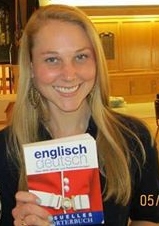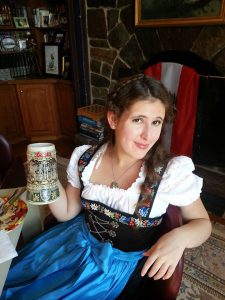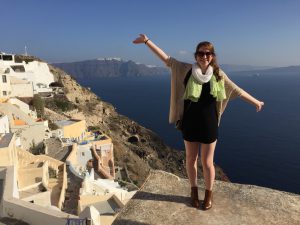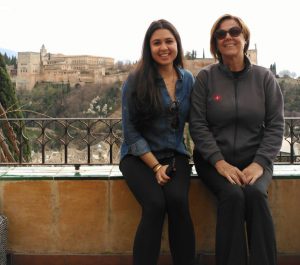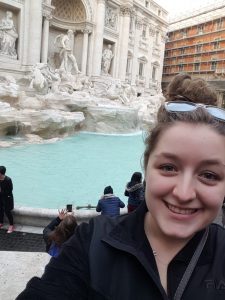New Study Abroad Awards
In 2016 the Department of Languages, Literatures and Cultures offered two new study abroad scholarships to our undergraduates in the spring of 2016: the Amanda Hagelstein travel awards and the Richard A. Zipser endowed study abroad scholarship. The first awards were generously organized by Caitlin Moon (BAFLL in French, Italian, and German 2015) in honor of her friend Amanda Hagelstein (BAFLL Three Languages 2014) who was tragically killed in a hit and run accident in March of 2015. To honor her friend, Caitlin raised funds for two study abroad awards that were given to MacKenzie Campbell (an International Business and Three Languages Major, 2017) who traveled to Rome, Italy, and Sibel Tekman (a History Major and Spanish Studies, German and European Studies Minor, 2016) who traveled to Granada, Spain in the spring of 2016.
In addition to the Hagelstein awards, during this semester the first Richard A. Zipser study abroad scholarship was given to Danielle Leppo (International Relations, German BA 2017) who traveled to Rome. Dr. Zipser retired in 2014 after serving as chair of the Department of Foreign Languages and Literatures for twenty-seven years. Under Dr. Zipser’s stewardship, FLL established more than thirty study abroad programs. As a long-time proponent of study abroad, upon his retirement, Dr. Zipser established the endowed study-abroad scholarship fund to benefit future DLLC students. Below you find an introduction to Amanda Hagelstein by Caitlin Moon as well as descriptions from the three awardees about their experiences while studying abroad in the spring of 2016.
On Amanda Hagelstein
Amanda Hagelstein was a tour de force. Brilliant and winning, she first entered my life as a result of a 300-level German Conversation class with total population of four students. One of the most unique and rewarding benefits of foreign language classes is that they offer an environment for students to get to know one another; you have to talk to each other in order to engage with the language. As everyone who had the pleasure of having class with her knows, Amanda was very engaging.
Amanda graduated in the spring of 2014 with a Triple Language Major in Spanish, French, and German. By virtue of the languages we both studied, she was one of only two friends that I would see in multiple language classes. Through class exercises, I was able to marvel at her adroitness in grammar in both French and German. In three languages, we discussed our shared love of travel, high heels, and yellow VW bugs, hers being named Felix. Through Amanda’s willingness to share her family’s heritage with me, I found myself well versed in German recipes and folk songs, as well as the proud owner of a very expensive dirndl that she relentlessly insisted I purchase.
In my opinion, Amanda’s skill in Foreign Languages stemmed from her best talent, her ability to listen. She applied this skill both in and out of the classroom, making her the best confidant that anyone could ask for. As we were both only children from complicated families, she was able to understand and support me during some of the most difficult periods of my life. After I experienced a personal tragedy, Amanda told me to “Go and do some good for someone else. It will make you feel better and it will change the world a little bit.”
After her sudden and untimely death, those words inspired me to channel my grief into positive action. Through our friends, many of whom are just out of college themselves, almost $2000 was raised in order to create a scholarship in Amanda’s honor that would help two promising students study abroad in Europe. Amanda credited her love of foreign languages to her German heritage and the multiple European trips that she was able to take with her family. These trips allowed her to interact directly with the cultures that she loved, while simultaneously honing her fluency. The recipients of the scholarship share Amanda’s passion for foreign languages, literatures, and cultures, while embodying her good will and character. The funds are intended to help them travel on a study abroad program focusing on the language of their choice, which will allow Amanda’s memory to endure through their continued progress and zeal.
I would like to thank everyone who helped to make this scholarship possible, including Frau Dr. Iris Busch, who was Amanda’s favorite professor and inspiration.
—Caitlin Moon
Mackenzie Campbell
Rome, Italy 2016
Studying abroad is everything it cracked up to be. As I write this I am studying in Rome, Italy at John Cabot University. I live in what is considered the heart of Rome: Trastevere. Cobblestone roads, yellow stucco buildings with balconies and flowerpots, gelaterias, pizzerias, cafés, Vespas, miniature cars that don’t stop for you, freshly squeezed orange juice that is better than the orange itself. This is Italy. A different restaurant every night, a different Roman pasta dish: Carbonara, Cacio e Pepe, or Amatriciana. We spend every morning at a café by our apartment where the owner, who speaks no English, communicates with us through his smile and who knows our orders by heart. “Un cappuccino e un cornetto semplice, per favore!” (“A cappuccino and a plain croissant, please!”)
Everyone speaks English in Rome; it will be hard to use your Italian. This has turned out to be a pleasant falsehood. My Italian has proven to be very useful in my everyday interactions with storeowners and locals, thickening the Italian-ness that now runs through my veins. Rome now feels like home. After each weekend in a new place, I can’t wait to get back to my small Viale di Trastevere apartment and the familiarity of my Roman routine. It feels normal to pay for everything in cash, to drag around a basket on the floor at the grocery store, to specify if I want my water still or frizzante, to eat dinner at eight o’clock or later, to leave my laundry on a rack to dry, to take the tram to class.
As I write this, I’m more than halfway through this amazing experience, and I have traveled to three other places in Italy and seven other countries. Each place is different, and each place gives me unique reasons for feeling so grateful for this opportunity. Beyond the beauty of every town lies the warmth of the people I have met: a shop owner in Santorini whose husband told us how excited she was that people from Boston came into her store the previous day; a Pakistani cab driver in Prague who speaks Czech, Slovak, English, Punjabi, and Hindi fluently (among other languages) and who told us all about how he ended up there; a bus tour ticket seller from Zimbabwe who met his Austrian girlfriend in the UK and who now works in Vienna so that he can be with her; an eighteen-year-old Korean girl living in Australia who is traveling around Europe for a month and a half alone; and finally, the owner of our hostel in Venice who used to play professional soccer in Lebanon and who is now a painter (he designed Carnevale masks for my friend and me). And I am only a little over halfway done. I cannot wait to see what France, Germany, the Amalfi Coast, and Florence have in store for me. I would not trade this opportunity for anything, for this experience is showing me an amazing part of the world.
Sibel Tekmen
Granada, Spain 2016
When I arrived in Spain in early January of this year, I had imagined that Granada would be a little town on the coast of the Mediterranean with white washed houses and palm trees. I imagined a rural yet exotic city filled with history and traditional Spanish culture. Although Granada is definitely an ancient city full of Christian, Jewish, and Muslim legacies, it is more cosmopolitan and busy than I had expected. I have been in Spain for nearly three months now, and I have noticed several differences in culture between Granada and the United States.
The most obvious cultural differences in Spain lie in the physical contrasts of the city. Granada is organized by winding and skinny cobblestone streets with endless rows of apartment buildings. Although this may be a typical European city layout, it is dissimilar to the layout of my home town, Rehoboth Beach, Delaware. Another aspect specifically unique to Granada is its most famous and dominating monument, the Alhambra. Modern roads that are a part of the city of Granada lead straight to the Alhambra, a massive fortress and palace left behind by the sultans of the Arab dynasties in Granada in the late fifteenth century. Granada is a goldmine in a sense that there are countless vestiges of history dating back hundreds of years.
The Spanish lifestyle was actually another aspect of my experience thus far in Granada that I thought would have been easier to accustom myself to. The Spanish daily schedule, or more precisely, the Andalusian schedule, is completely different from a typical American schedule. The largest meal of the day is eaten at around 3:00 pm and then dinner is not served until late in the evening, around 9:00 pm. Furthermore, there is a break in the middle of the day to eat lunch and rest, which is between 2:00 pm and 5:00 pm in the afternoon. This change of pace was especially difficult to adapt to for me because I ended up napping after lunch and loosing several hours of the day! Nevertheless, the siesta serves as a time to reenergize to finish the day enthusiastically and efficiently.
I am most fascinated by the amount of Arabic culture still prevalent today in Granada. There is a genuine respect and appreciation for the accomplishments and culture of the Arabs in Andalucía in the centuries between 711 and 1492. Countless museums and organizations seek to preserve and understand the legacy left behind by the Umayyad and Nasrid dynasties of Andalucía. Many buildings still preserve the typical Arabic architecture and many new construction projects seek to perpetuate this specific style. In addition, there is a current curiosity for the Arabic culture as well. For example, I am fortunate enough to attend monthly meetings of the book club of the Euro-Arab Foundation of Granada with Amalia Pulgarin, the program director in Granada for GRIIS. In these meetings, members discussed literary works of contemporary Arab writers. Although I may not understand the entirety of the discussions, I use this time to listen and try to understand the different opinions.
It has been an adventure and an enlightening experience in Spain during the past few months. I have learned so much, not only about Spanish and Andalucian culture, but also about the European lifestyle as well. Although my ideas of Granada were not accurate upon arrival, my experience thus far has still been a positive and educational journey.
Danielle Leppo
Rome, Italy 2016
My name is Danielle Leppo and I am a junior studying International Relations and German. It has always been a dream of mine to study abroad and learn as much as I can about the world and to travel as much as possible. Even though I am a German major, I thought studying in Italy would be helpful. Since I am also an International Relations major, I thought it would be beneficial to learn more about another culture to broaden my horizons on the international front.
I was thrusting myself into the unknown and I was anxious beyond belief when I was finally accepted to the study abroad program. Knowing the high cost of studying abroad I was so thankful when I received the email informing me that I had been awarded an additional scholarship from Dr. Richard A. Zipser for my trip abroad. This generous donation helped lift some of the monetary burdens of my semester in Rome off my parents’ shoulders.
I am currently two months into my study abroad program. I am in love with Rome and would not trade this opportunity for anything else. I have already travelled to numerous other countries as well as other areas of Italy. I have made incredible friends and I have learned so much. The classroom setting alone is so different from back home. Even though I am attending an American university, there are huge differences between teaching styles. Some days professors will suggest we go for a walk outside while addressing the classroom material. I also went on a trip with a class to the Italian Parliament and the Italian Senate as well. All these excursions and “on site” classes are so much more beneficial for learning.
This trip has been educational in ways I did not realize it would be. For example, living with four other girls has been quite the struggle. We all have very different definitions of cleanliness and it has been stressful trying to keep things taken care of while also staying positive and friendly. I have definitely had to learn how to compromise and adapt.
We have all had both good and bad experiences here in Rome but I would say that the good far outweighs the bad. More than half the people I know have had phones, wallets, and even passports stolen from them; but at the same time, we also get to eat incredible food and see beautiful and historical sights all while living in the Eternal City. This is definitely the opportunity of a lifetime.
This entry was posted in Noteworthy, Polyglot and tagged Amanda Hagelstein, Caitlin Moon, Danielle Leppo, Fall 2016 Polyglot, German, Italian, Mackenzie Campbell, Sibel Tekmen, Spanish.

